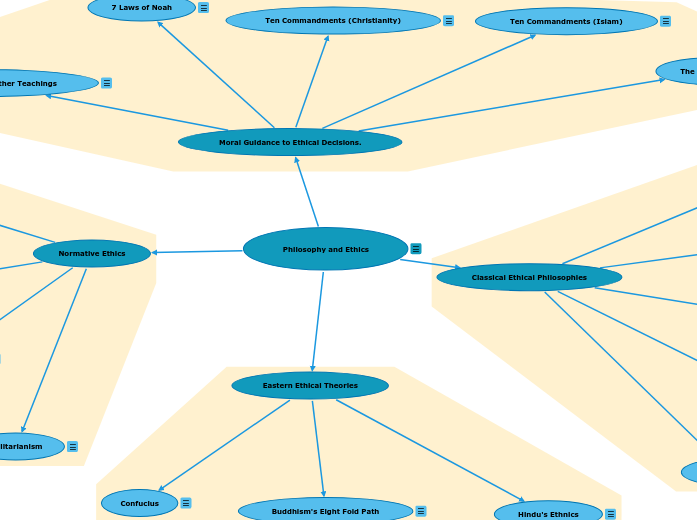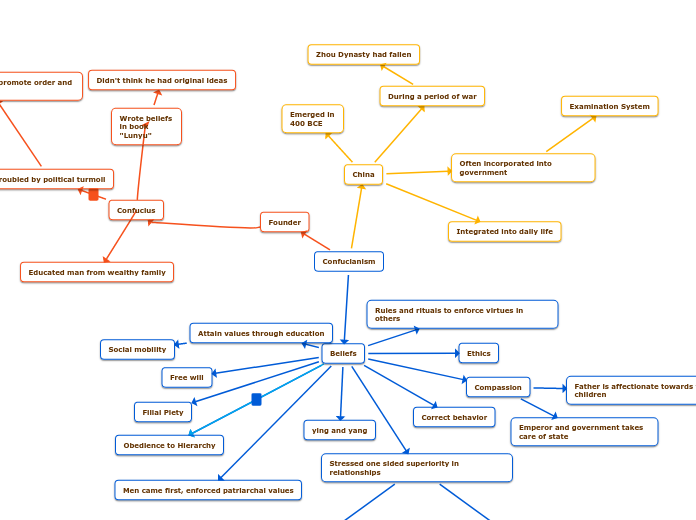Philosophy and Ethics
Philosophy is the study of questions about existence, knowledge, values, reason, mind etc. Often through critival analysis, debate, and reflection.
Moral Guidance to Ethical Decisions.
Anishinaabe 7 Grandfather Teachings
- Respect: Place others before you and be mindful of nature around you.
- Love: You must love yourself before you love those around you
- Truth: Be true to yourself and reflect on yourself before others
- Bravery: Defend what you believe is right even when you are in a time of uncertainty
- Wisdom: Being wise gives you the ability to be open minded and listen to others ideas
- Honesty: Be honest with yourself and others.
- Humility: Be humble and act selflessly
7 Laws of Noah
- Do not deny god
- Do not speak bad about god
- Do not murder
- Do not do illicit acts of sex
- Do not steal
- Do not eat from a live animal
- Create legal system to enforce the laws.
Ten Commandments (Islam)
- Do not say their is another god
- Be kind to your parents
- Do not murder your child
- Do not do shameful acts
- Do not kill anyone unless they have been through due process of law
- Protect the rights of those who may be unfortunate
- Be fair
- Be unbiased
- Keep to ones promise
- Follow the straight path of god
Ten Commandments (Christianity)
- Thou shall have no god before me
- Thou shall not make idols
- Thou shall not say the lords name in vain
- Remember Sabbath day and keep it holy
- Honour your father and mother
- Thou shall not murder
- Thou shall not commit adultery
- Thou shall not steal
- Thou shall not bear fake witness on thy neighbour
- Thou shall not be covet
The Golden Rule
Treat others how you wish to be treated.
Classical Ethical Philosophies
Cynisism
Cynicism says that the way to achieve a good life is not through material things but by living a simple, virtuous life in harmony with nature.
Epicureanism
Epicureanism is similar to cynicism but less extreme, they advocate for simple living, moderation, and rational thought.
Stoicism
Stoicism, which has gained popularity recently with young men, is the belief that events in life are predetermined and the only thing we control is how we react to them.
Plato's View
Plato believed ethics could be achieved through rational thought and reasoning. He argued that getting philosophical wisdom allows reason to rule and create an ethical person.
Aristotle's View
Unlike Plato, Aristotle viewed ethics on the individual level. He believed that ethics looks different for everyone and should be achieved by looking at your surroundings and reflecting and adjusting.
Eastern Ethical Theories
Buddhism's Eight Fold Path
The Eight Fold Path goes like this:
- Right understanding: understanding the 4 noble truths (life is suffering, suffering involve a chain of causes, suffering can stop, there is a path to fix the suffering)
- Right intention: commit to self improvement
- Right speech: do not slander, speak the truth
- Right action: Be peaceful, don't steal, don't kill.
- Right livelihood: avoid jobs that exist to harm, like weapon manufacturing, military member, or police officer.
- Right effort: free your mind of bad places
- Right mindfulness: develop awareness of the body and mind
- Right concentration: meditate and focus on the mind
Hindu's Ethnics
Hindu ethics is derived from your Dharma (duty), Karma (cause and effect), and Moksha (liberation). Key values include non-violence, truthfulness, non-stealing, self discipline, and non-possessiveness.
Confucius
Confucius believed that an ethical existence could exist through the cultivation of virtuous individuals as the practice of ethical relationships. Those relationships are these:
- Father to son
- Older brother to younger brother
- Husband to wife
- Elderly to youngins
- Ruler to subject
His views on ethics were very hierarchical.
Normative Ethics
Deontology
Deontology judges if a choice is ethical or not by the intention behind it and argues that actions are right if they adhere to one's moral duties and obligations.
Utilitarianism
Utilitarianism advocates to do things that give you happiness instead of ones that make you sad. Also it judges the ethics of one's actions by the outcome, so the ends justify the means.
Virtue Ethics
Virtue ethics looks to do virtuous traits like honesty, courage, and compassion to guide ethical decisions. Virtue ethics focuses on character rather than rules or consequences.
Cintractarianism
Contractarianism theories say that ethical principles stem from a social contract where people agree on rules for mutual benefit. It focuses on rational self interest within the agreed upon framework.









